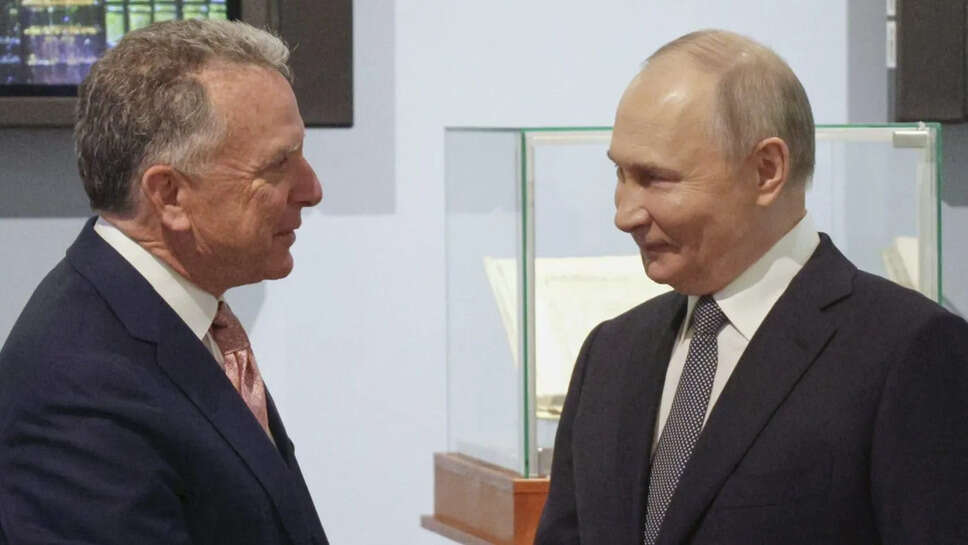Trump's Ceasefire Ultimatum Looms as US Envoy Witkoff Arrives in Moscow

In a dramatic escalation of diplomatic pressure, US Special Envoy Daniel Witkoff landed in Moscow today just hours after former President and current presidential frontrunner Donald Trump issued a public ultimatum to Russia, demanding an immediate ceasefire in the ongoing Eastern European conflict. The surprise visit signals a new phase in America's attempt to de-escalate tensions as the war continues to rage with global consequences.
While Trump’s comments — described by many as “a thinly veiled threat laced with urgency” — have drawn widespread attention, Witkoff’s arrival adds substance to rhetoric. Behind closed doors, Washington is moving quickly, leveraging diplomacy as Trump simultaneously reasserts his influence on the international stage ahead of the upcoming elections.
Witkoff’s Mission: Diplomacy Under Pressure
Daniel Witkoff, a seasoned diplomat with experience in high-risk negotiations, is expected to meet top Russian officials, including aides from the Foreign Ministry and potentially Kremlin advisors, over the next 48 hours. His visit comes without a formal announcement from the US State Department, a move many analysts see as deliberate — signaling urgency and discretion.
According to a senior administration source familiar with the visit, the key objectives of Witkoff’s trip are:
-
To deliver a classified diplomatic message from Trump’s team urging Russia to consider an immediate ceasefire
-
To assess the Kremlin’s appetite for negotiations amid increasing international pressure
-
To open preliminary dialogue on future US-Russia engagement should Trump return to office
Though the White House has distanced itself from the trip — given Trump’s unofficial status — diplomatic observers believe the visit carries weight. One official noted, “Witkoff isn’t a tourist. He’s here because serious conversations are beginning again.”
The Ultimatum: Trump’s Ceasefire Line in the Sand
Earlier this week, in a highly publicized interview, Donald Trump declared that if Russia fails to agree to a ceasefire “within days,” the United States under his potential leadership would take “decisive steps” to ensure peace in the region. While Trump did not elaborate on what those steps would include, his language hinted at increased economic pressure and potential diplomatic isolation.
“The world has had enough. The war must stop. And if it doesn’t, there will be consequences — big consequences — that nobody in Moscow will like,” Trump said during the interview.
Critics called the move theatrical, while supporters praised Trump’s direct, no-nonsense approach to foreign affairs. Regardless of political perspective, the comments have stirred anxiety among NATO allies and provoked measured responses from Moscow, which described the statements as “election-season dramatics.”
Moscow’s Response: Calculated Calm
The Russian government, while publicly downplaying Trump’s ultimatum, has taken a cautious approach to Witkoff’s arrival. Kremlin spokespersons have labeled the visit as “routine backchannel dialogue” but have not ruled out substantive talks.
In a carefully worded statement, Russian Foreign Ministry official Maria Zakharova said:
“We are always open to peaceful dialogue, even if the messengers come from unofficial channels. Russia will listen, but will not yield to threats — spoken or unspoken.”
Behind the scenes, however, Russian analysts are closely watching Trump’s momentum in the US election polls and reassessing their diplomatic strategy, should he return to power.
Global Stakes: More Than Just Russia and the US
Witkoff’s visit and Trump’s statements come at a time when the global community is desperate for de-escalation. The war has had wide-reaching consequences: energy markets remain volatile, food supply chains are disrupted, and tensions between NATO and Russia are at their highest since the Cold War.
European leaders, while wary of Trump’s return to global diplomacy, are cautiously optimistic that any path to ceasefire — even one driven by political calculations — is preferable to prolonged conflict.
Ukrainian President Volodymyr Zelenskyy has not responded directly to Trump’s comments but has reiterated that “no ceasefire is acceptable without the complete withdrawal of Russian troops.” His stance complicates the prospects for any immediate truce, but also signals the urgency of mediation efforts that take into account both Ukrainian sovereignty and geopolitical reality.
Expert Analysis: What This Means for the World
International relations experts say that Witkoff’s sudden visit and Trump’s bold posture could create unexpected diplomatic openings, especially if the Kremlin believes Trump’s return is likely.
Dr. Anika Roy, a professor of geopolitical strategy at King’s College London, explained:
“The Kremlin is a realist actor. If they see a second Trump presidency as inevitable, they may choose to re-engage earlier, even unofficially, to secure better terms. Witkoff’s presence offers a face-saving way to open that door.”
Others warn of potential backfire. Some NATO allies fear Trump’s unilateral approach could undermine existing collective frameworks, especially if it pressures Ukraine to accept terms unfavorable to its security or territorial integrity.
A Calculated Gamble or Masterstroke?
Trump’s decision to issue an ultimatum, paired with Witkoff’s discreet yet high-profile visit, is being read as both a political gambit and a diplomatic experiment. As election season heats up in the United States, Trump is looking to reclaim his role as a global dealmaker — the architect of unpredictable but impactful diplomacy.
Witkoff, long considered part of Trump’s quiet diplomatic brain trust, is now the face of this initiative. His task is monumental: to re-open dialogue without undermining official US policy, and to explore peace possibilities without legitimizing Russian aggression.
It’s a tightrope walk with consequences not just for the region, but for global stability, and for Trump’s own legacy.
The World Watches Moscow
As Daniel Witkoff moves from one high-level meeting to another inside the diplomatic halls of Moscow, the world watches — not just to see if a ceasefire is possible, but whether a new chapter in US-Russia relations is being sketched out before ballots are even cast in the United States.
Whether this marks the beginning of a real thaw, or is just another flash of diplomatic theater, will unfold in the days ahead. But for now, one thing is certain: the conversation has begun again — and it started with a landing in Moscow.
